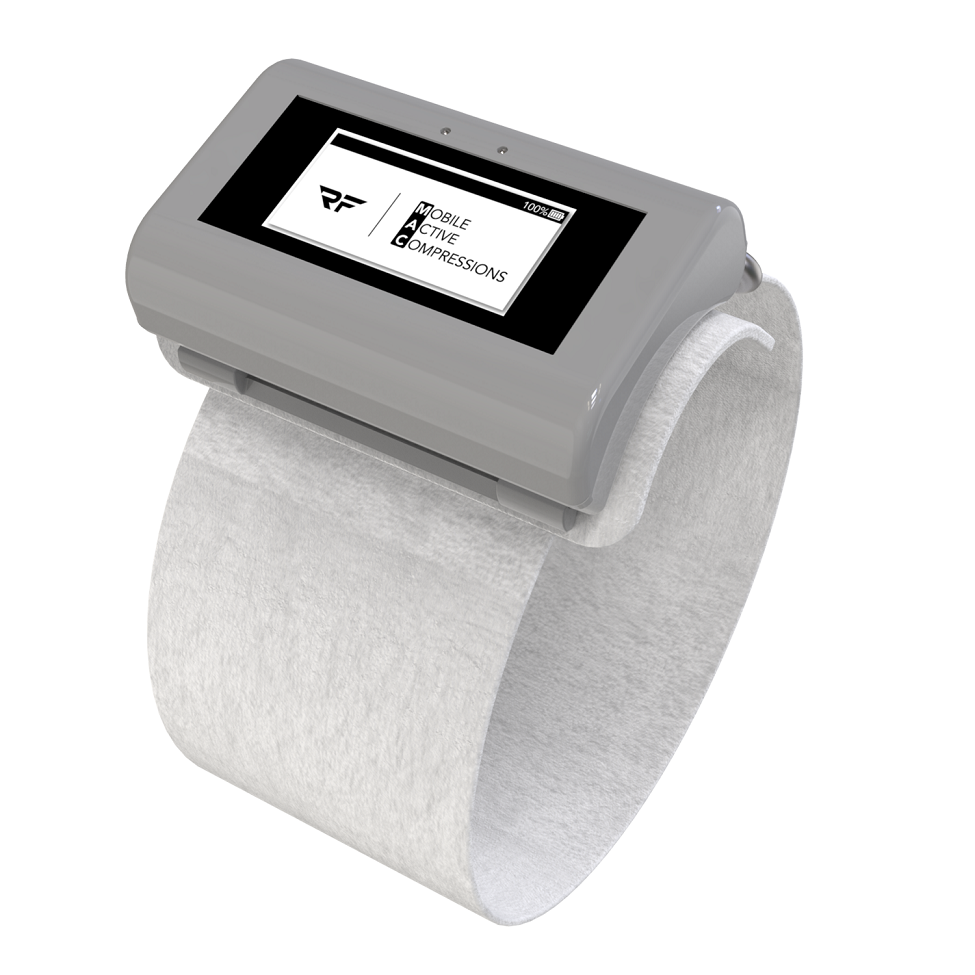New Compression Device Aims to ‘Squeeze’ the Competition
 A device is attached to each disposable sleeve to track patients' mobility data.
A device is attached to each disposable sleeve to track patients' mobility data.
Subscriber Benefit
As a subscriber you can listen to articles at work, in the car, or while you work out. Subscribe NowA Fishers-based company says it’s creating a replacement for “one of the most universally-hated products” among surgical patients. Although detested, intermittent pneumatic compression (IPC) devices are required after the vast majority of surgeries; worn on the calf from knee to ankle, the sleeves squeeze the legs every 60 seconds, increasing blood flow to prevent clots due to immobility. Following a major boost—$1.8 million from the National Institutes of Health (NIH)—Recovery Force will soon have Hoosiers testing its compression device, which the startup says patients will no longer loathe, and doctors will celebrate for the added benefit of mobility data.
Recovery Force Chief Operating Officer Jason Bobay says standard IPC machines are large, cumbersome electric devices involving cords and hoses that are prone to tangling and tripping nurses working with patients during the night. Patients complain the sleeves, with air bladders lining the interior, make their calves sweaty, itchy and irritated.
Bobay says it leads to low patient compliance, “which puts the hospital, and most importantly, the patient at risk of deep vein thrombosis (a blood clot that forms in a deep vein of the thigh or lower leg) or pulmonary embolism (a blockage in the vessel), which could be deadly.”
Recovery Force leaders say its portable Mobile Active Compressions (MAC) device is superior to standard compression machines in many ways, but patients care most about the comfort. Rather than sleeves lined with “suffocating” air bladders, Recovery Force’s technology embeds shape-changing memory fibers into the “breathable, lightweight” garment that comprises the sleeves, eliminating the clumsy air hoses. The startup says the sleeves deliver the same compressions as standard machines, but the system operates on a 24-hour lithium-ion battery, eliminating the need for an electrical cord.
The MAC device sleeves are also disposable—a major benefit to hospitals for ease of use and cost reduction, says Bobay.
Each sleeve is operated by an attached three-inch controller device—a critical addition that sharpens the startup’s competitive edge, says Bobay. While the sleeves are disposable, the controller devices are not; they track and display patients’ mobility data, such as how long they’ve been in bed, sitting in a chair and the number of steps they’ve taken.
“Typically, those mobility characteristics have been blinded; nobody really knows what’s been going on with the patient outside of, ‘They’ve been laying down for a while.’ Our device makes all of that mobility data transparent to anyone who looks at the device,” says Bobay. “The idea is to compare today’s data against yesterday’s data. Every day in terms of recovery, if we beat yesterday, we’re going to get better quicker.”
The device displays the mobility stats for doctors, nurses and the patient; Bobay says it will soon be able to wirelessly transmit the data to the patient’s electronic medical record. Recovery Force says, in a larger context, the MAC device is also a mobility tracker that can help hospitals manage other hospital-acquired conditions beyond deep vein thrombosis.
“That includes infections like pneumonia; if you don’t get up and move, your lungs aren’t working as well as they should be, and that often causes pneumonia in the hospital,” says Bobay. “You can get pressure sores or injuries, where if you don’t move in bed, you get ulcers. That can cause sepsis and other infections.”
Bobay says the recent $1.8 million NIH grant is of “massive significance” and “shows the NIH sees this as a disruptive, promising product that will change the way patients get mechanical compressions in the hospital system.”
The grant will also fund a study at the Sidney & Lois Eskenazi Hospital in Indianapolis, where patients undergoing total hip or knee replacements—the highest risk group for DVT—will test the device. Half of the patients will receive standard treatment, while the other half will use the MAC device during the short hospital stay and take the device home. The study will examine if the patients using the MAC device mobilize earlier in their recovery and how their mobility progresses.
“Joint replacement patients are one of highest risk for DVT, because they go home pretty quickly from the hospital, and they’re typically not very mobile,” says Bobay. “Many people don’t want to get up because it hurts, but that stifles their recovery. We’re trying to give them data to empower them to manage their own care when they go home.”
The startup, which works out of Launch Fishers, is expecting Food and Drug Administration (FDA) approval later this year; an earlier model already earned regulatory approval. Recovery Force says it plans to launch commercially in early 2020, aiming to bring comfort and convenience to compression devices.
Bobay says Recovery Force has other products in the pipeline that focus on athletic performance and recovery.
Bobay says the startup worked closely with local hospitals to ensure the device would fit within nurses’ workflow, such as having a 24-hour battery life to eliminate frequent charging.
